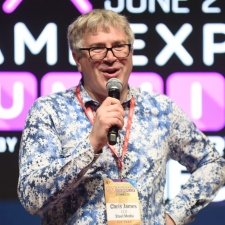The inaugural GameExpo Summit took place in Dubai (United Arab Emirates) this week, hosted by Pocket Gamer Connects as part of our long-running international conference series.
It provided a dedicated knowledge-sharing and networking venue for games industry professionals, alongside the GameExpo esports festival at Dubai Exhibition Centre at Expo 2020. With over 1,300 registered attendees, it was a genuine hub for insiders from all over the world, not just MENA.
June 21-22 saw this first GameExpo Summit welcome over 800 companies from some 60 countries. We saw almost 100 experts share fascinating insights. Meanwhile, a vibrant expo area in the Dubai Exhibition Center showcased local and international indie development teams. There were pavilions representing the Pakistan, Jordan, and Saudi Arabia games industries, for instance.
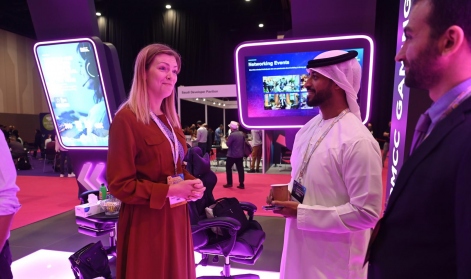
If you couldn’t make it, here’s what you missed on stage on the first day (find the second day here):
Dubai embraces esports and technology
The conference opened with an address by Dr Marwan Al Zarooni, strategic advisor to Dubai’s Department of Economy and Tourism. “Esports are at the forefront of Dubai’s economy – for engaging our kids, but also engaging developers,” he told the audience.
He also stressed the importance of networking, exploring and growing. “People who are adaptive to change are the ones that prosper,” he said, thanking attendees for “coming here with an open mind [and] meeting new people.”
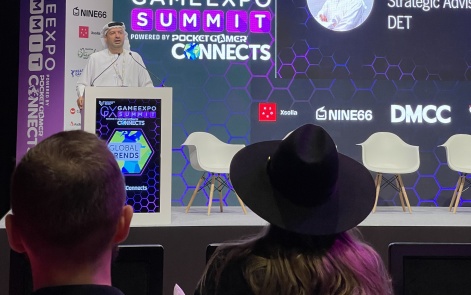
Dr Al Zarooni continued: “The technologies that you think are disrupting you are actually new opportunities. Let’s seek new opportunities and look for new conversations. Get out of your comfort zone.”
Dubai is very eager to take advantage of the esports ecosystem, which forms a part of its D33 economic agenda, a 10-year outlook for how Dubai “is going to double its GDP”.
One of the aspects is embracing new technology. “We have a metaverse strategy,” said Dr Zarooni. “Gaming is at the forefront of that as well. AI will play a huge role in gaming. It’s going to be a very exciting world – perhaps a scary world for some developers. But please embrace change and continue building.”
Navigating regulation in China's gaming industry
Over on the GameDev Stories track, iDreamSky’s Jeff Lyndon wowed attendees with the scale of the Chinese market. With some 660 million gamers, China is not a market to be ignored, despite the layers of regulation.
“Just how regulated is China?” was the question Lyndon posted. “You need to log into Gardenscapes with your national ID, which is then checked by the police,” he confirmed. There was a rule that if you were underage, you could only play four hours a day during national holidays (usually 1 hour a day during a regular week).
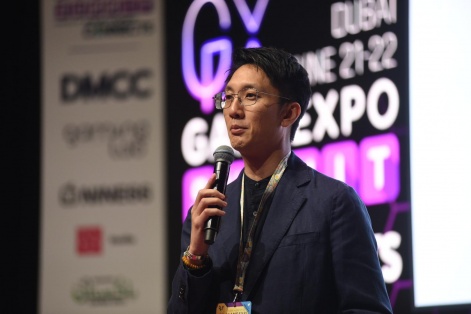
The authorities release only 80 to 100 ISBN game licences every month (during the pandemic, this dropped to every three or even every six months). You also need an ICP game operating licence. “And to get that, you have to be a 100% inland company,” said Lyndon. “The studio cannot be a foreign company; it cannot even be 1% owned by an outside company.” That’s why you need a local publishing partner.
But this regulation has an unexpected effect. The talk looked at a creative phenomenon - how did China get so good at making “anime-style games” in recent years? Japanese games struggled to get authorised in China, but gamers still wanted that sort of game. Hence, local studios and publishers became adept at creating games to that taste.
Chinese developers became good at making [Japanese-style] games: action, story, style, but without being too revealingJeff Lyndon, iDreamSky
“Japanese games are often too revealing and couldn’t get licences,” Lyndon told the audience. “So Chinese developers became good at making that sort of game: action, story, style, but without being too revealing. Sexy anime characters, but with less revealing designs, to suit the Chinese market.”
Lyndon jokes about this being a conspiracy theory: did the Chinese government reduce the number of licences to force Chinese developers to make fewer games but of much higher quality, which could then be exported?
Building a MENA games ecosystem
The Middle East remains the fastest-growing region in games, and the Dubai environment provided the perfect venue to inform attendees about unique aspects of the region’s industry. Despite its obvious potential, it’s still emerging in terms of activity. The UAE just hosted its first-ever game jam.
Kadri Harma, CEO of Nine66, hosted a revealing panel about trends in the MENA market. “The MENA Advance: Latest Trends & Growing the Ecosystem for the Gaming Market in the Region” featured advice from Belal Jassoma (DMCC), Aravind Swaminathan (Calyx Gaming), Ali Alharbi (UMX Studio), John Lacey (Tencent) and Mahmoud Ziater (True Gaming).
“The region has very high mobile penetration and a large youth population,” explained Jassoma. “The UAE is the fifth largest market globally for games influencers.”
“When people here love games, they spend money,” added Alharbi, drawing attention to the high proportion of whales among gamers here. “They can spend 100,000 dollars, maybe. There are big spenders.”
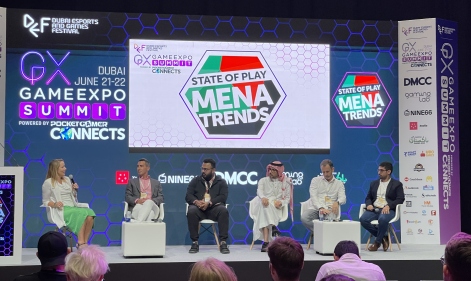
But one thing was clear – it’s important not to think of “the Middle East” as one homogenous region. “Localisation is a key thing,” said Lacey. “Not just language, but all types of resources across your operation. Publishing at a country-by-country level, for instance. There are 16 distinct countries here, not just one MENA region.”
Lacey also drew attention to the official support various local governments give the games industry. “I’ve never seen this level of interest at a governmental level in the games market,” he revealed.
Alongside the GameExpo Summit was the DEF, where esports featured prominently. It’s no surprise, then, that the panel dived deep into the growth of esports, describing Dubai as an esports-first region (game development coming in second).
Always try to find a new audience for the projects you already have. It’s harder to launch whole new projects!Anton Gorodetsky, My.Games
Swaminathan explained that “the reason why it’s so big is that everything is built around communities. Back in the day, people used to go to cafés and gaming cafés. Esports are a natural extension of that. It’s what put the region on the map.”
Lacey added, “Over the next decade, there is an opportunity for the Middle East to change the narrative on esports and learn from the mistakes from elsewhere around the world. It’s a separate business from publishing.”
Growing with influencers and creators
TikTok took part in a fireside chat on The Growth Track, with Leonid Blinov (head of gaming, e-commerce & ecosystems) quipping, “Probably even your grandmother has heard of TikTok”.
The panel aimed to look at the value of influencers and social media creators. The other participant was Anton Gorodetsky, head of industry relations at My.Games, a publisher with 1,500 people working around the globe. The secret of their success? Diversification. He said: “Diversify or die. We have expertise in many different genres.”
The company recently opened an office in Abu Dhabi, and Gorodetsky stressed the business value of exploring new markets. “Always try to find a new audience for the projects you already have. It’s harder to launch whole new projects! We try to find new people to play the genres we already have.”
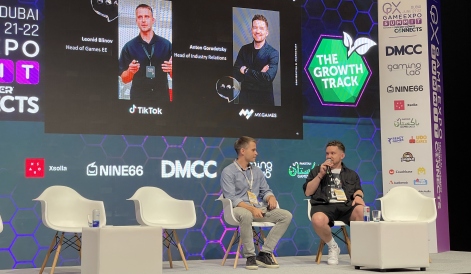
One important observation was that MENA and LATAM are the only two markets to experience growth in the world in the last year.
My.Games saw great success when it participated in the TikTok creative challenge, which partners publishers with creatives who know the platform. The next initiative from TikTok and My.Games is the Developers’ Program.
Esports, brands and the mainstream
Despite some narrow perceptions of gaming by the older generation in the MENA region, one Growth Track panel pointed out that “we’re in a platinum age of gaming because it reaches all genders, all age brackets, all types of gamers.”
This was the “Gaming+: Connecting Non-Endemic Brands” discussion, featuring Hanting Zhu (gaming & esports lead, Publicis Groupe), Amine Sadik (media & digital director, P&G Arabic Peninsula & Levant), Racha Makarem (CEO, Starcom), Aya Laimoun (gaming lead, Pizza Hut Middle East & Pakistan). The purpose was to discuss how big, non-game advertisers can engage authentically with players and viewers.
Makarem said, “We have to debunk the thought that gaming is niche – it’s not; it’s far from niche! People sometimes think that games advertising is just for gaming brands, and that’s not true.”
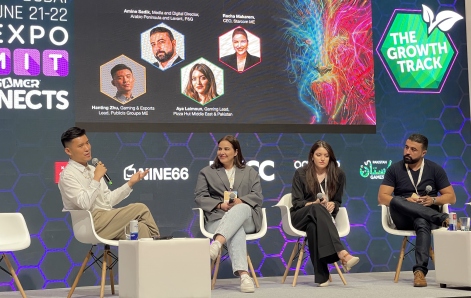
“It’s important to engage with gamers in an authentic way,” stressed Laimoun. “We’re still in the early stages but have been doing gaming for a year now. The willingness of the audience to watch the esports tournaments we’re hosting shows the potential. [Esports] is still ownable if you’re doing it in a tactical way that works for your brand. Pizza Hut wants to be that brand the people here associate gaming with.”
The messages of this panel were echoed by the “Communication, Marketing & PR in Gaming & Esports” lecture that followed. Tarek Hakim (communications consultant, Active DMC) spoke on the Esports Innovations track and told the room: “You never want to talk down or up to somebody – you must talk to them at the same level. People love to feel heard, and when they’re heard, they will be emotionally invested in you.”
According to Hakim, the last Rocket League RLCS Fall Split championship in MENA had 23,000 peak viewers and some 123,000 hours watched. He also drew attention to Riot’s work in MENA. He praised how Riot localised games like Wild Rift, including social media and customer services in Arabic.
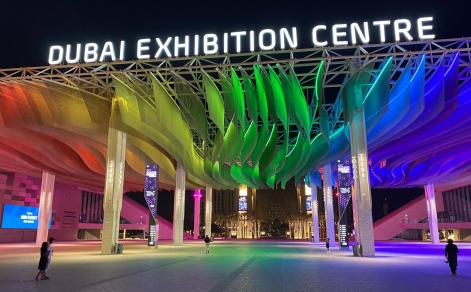
There were some 100 speakers, so this summary barely scratches the surface. We also have an overview of the second day’s activity for you to catch up on. Recordings of both days’ sessions will be available in the event’s Video Vault soon. For more live events like this, please visit PGConnects.com. The next stop on the Pocket Gamer Connects roadshow will be Toronto in July, while we return to the Middle East for November’s Jordan conference.

